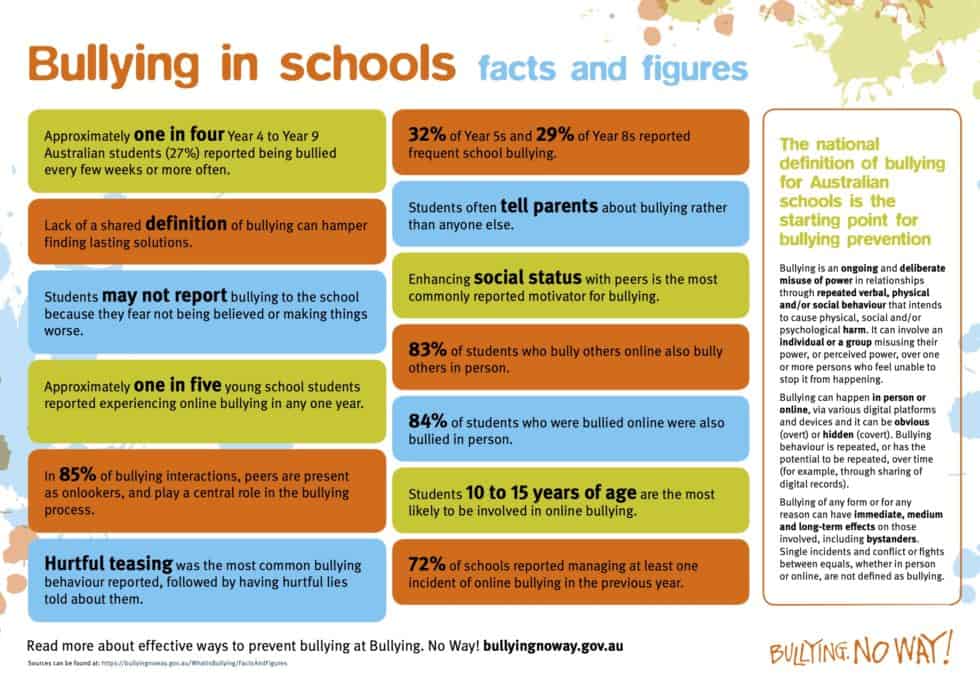By: Collett Smart
Nothing stirs the heart of a parent more than bullying. I don’t think there is a week that goes by without a story in the media about a child being bullied.
I sat with another parent in pain as she told me about her daughter’s anguish at being bullied. The mother found out about it one night, when she and her partner heard their daughter quietly sobbing after lights out. In desperation, her daughter finally asked her dad, “What would you do if someone threw stuff at you everyday?” Her daughter had endured days of having bottles, pebbles and other paraphernalia thrown at her during break times. There was the usual ringleader, the sidekicks and the the bystanders.
Bullying has terrible effects on the victims involved, but one of the toughest things to process, as a parent, is the question, “What if my child is the bully?” What happens when you get a call from your child’s school and hear the words, “I’m afraid that your child has been bullying someone in their class. Please could you come in for a meeting?” Let’s assume that there has been no misunderstanding and this is not just a one-off mean incident or disagreement between friends. The definition of bullying, supplied by The National Centre Against Bullying
“Bullying is an ongoing and deliberate misuse of power in relationships through repeated verbal, physical and/or social behaviour that intends to cause physical, social and/or psychological harm. It can involve an individual or a group misusing their power, or perceived power, over one or more persons who feel unable to stop it from happening.
Bullying can happen in person or online, via various digital platforms and devices and it can be obvious (overt) or hidden (covert). Bullying behaviour is repeated, or has the potential to be repeated, over time (for example, through sharing of digital records).
Bullying of any form or for any reason can have immediate, medium and long-term effects on those involved, including bystanders.
Single incidents and conflict or fights between equals, whether in person or online, are not defined as bullying.”
Facts and Figures by Bullying No Way:

Start by taking a deeper look at the reasons for their behaviour.
There are many reasons a child might bully others:
- Peer pressure – where another child is the ‘chief bully’ and your child feels they must join in to maintain the friendship and be accepted.
- Unhealthy self-preservation – your teen might have been a victim of bullying themselves and decides to choose to be a bully in an unhealthy form of self-preservation. Or your teen may fear the bully turning on them, so joins in the bullying behaviour to direct attention away from themselves.
- Poor anger management skills – e.g. when your teen hasn’t learned to control their emotions well and chooses a few of the same people to take their anger out on, when things don’t go their way (using either verbal or physical aggression to deal with conflict).
- Poor impulse control – e.g. might regularly lash out at the same kids in sport and games and is often an arrogant winner or a sore loser.
- For social status (and power) – some young people use fear or intimidation to try to be the most popular in an unhealthy peer group.
- Poor self-worth – when a young person pulls others down, out of envy or unhealthy comparison/ competition.
- Lacking empathy – for others who are different to themselves.
- Something they have learned in the family, through observing the way a parent or older sibling treats family members or work colleagues. (Note: this is often assumed to be the main issue behind bullying, but is certainly not always the case. I have seen children in stable families who choose to engage in bullying behaviour for a period of time. Simplistically blaming parenting can lead adults to overlook underlying issues in the child. Which is why we must look into the many areas.)
- A combination of any of the above.
What can you do to help your tween or teen move forward in healthier ways?
- Stay calm and take time to process the information yourself.
- Address the bullying behaviour directly. Explain the facts of what you have been told. Express that hurting another person is never okay, and that hurting is not part of your family values. This demonstrates your awareness of the situation and that bullying is not acceptable in your family.
- Avoid shaming your child and look for a pattern. Communicate that they can talk to you about their own insecurities and fears. Take time to find out the underlying need for their behaviour (as above).
- Don’t make excuses for your teen’s behaviour. Remind your child that bullying is a choice and they can choose to stop. Talk about the different forms of bullying (emotional, physical and psychological, and be sure to include the online forms).
- Talk about the effects on the victim/s. Help your tween to acknowledge their responsibility and recognise exactly what it is they have done or caused. Where appropriate, help your tween draft an apology to the victim. (Be aware that some children might not be good at taking responsibility for their own actions and initially blame others for their behaviour.)
- Set age-appropriate consequences for their behaviour, support the school’s plan for natural consequences and check in regularly to track your child’s progress.
- If your teenager is both a bully and a victim, help them make a decision to stop their own behaviour but develop skills to deal with being bullied themselves. (Ask who they might talk to at school and home, if they are being bullied.)
- Be a role model. Over the next few months, connect with your teen and talk often about healthy friendships and what being a kind human looks like (use memes, movies and stories to help you).
- Help your child to develop new skills and explore hanging out with new groups that might improve their sense of worth and develop healthy social skills (e.g. sport, arts, activities, community youth groups, family friends etc).
- Obtain the assistance of a mentor, a coach or a counsellor in teaching your child to practice new social and emotional skills. Your GP or school counsellor will have the contact details of professionals in your area.
One last thought
Our teens are still works in progress (actually so are we). While bullies most certainly need to face natural consequences for their choices and behaviours, we need to also provide them with support and access to tools which will help them to make healthier choices going forward. Adults who are bullies, didn’t become like that overnight.
Remember my parenting mantra? – “Parent with your child’s future adult in mind.”
Article supplied with thanks to Raising Teenagers
About the Author: Collett Smart is a psychologist, qualified teacher, speaker and internationally published author. She lives with her husband and 3 children in Sydney, Australia. The heart of Collett’s work is to support and bring Hope to parents of tweens and teens.

